US Told Iran It's Not Seeking Regime Change - IRGC Official
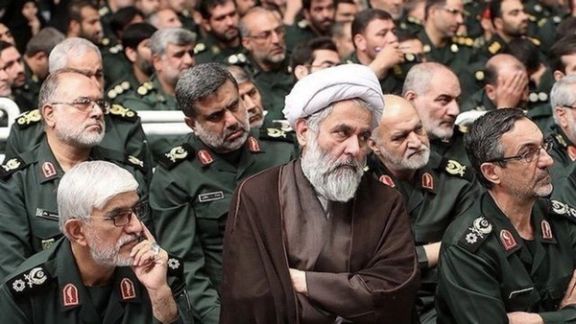
The former intelligence chief of Iran’s Revolutionary Guards says the US has sent messages to the regime to say it is not seeking a regime change in Iran.

The former intelligence chief of Iran’s Revolutionary Guards says the US has sent messages to the regime to say it is not seeking a regime change in Iran.
Hossein Taeb said Thursday that the US sent the message through three neighboring countries of Iraq, Qatar and Oman, saying that it is not looking to overthrow the regime "so let's negotiate and reach an understanding.”
Taeb, who now serves as an advisor to the Guards commander-in-chief, claimed that Washington’s volte-face is the result of the “stability” of the Islamic Republic.
“In the hybrid warfare the enemies launched against our country last year, they intended to put Iran at the crossroads of continuing its revolutionary path or facing international isolation," he said, boasting that they failed.
“Friends and foes have understood that they need to interact with the Islamic Republic,” he added.
In the Islamic Republic jargon, ‘enemies’ usually means the United States and Israel, and recently every entity and individual who has expressed support for antiregime protests ignited by the death in custody of 22-year-old Mahsa Amini in September 2022.
It has been the boldest uprising against the Islamic Republic since establishment in 1979 when the regime adopted a staunch anti-West and anti Israel foreign policy, and domination of the region.
Taeb added that the US presence in the Middle East is weakening partly due to the war in Ukraine and many countries are choosing a more independent path.
He claimed that, nevertheless, the enemies attempt to create “an all-encompassing riot before the upcoming elections aimed at boycotting and postponing the elections under various pretexts.” He was referring to Iran's parliamentary elections in March 2024.
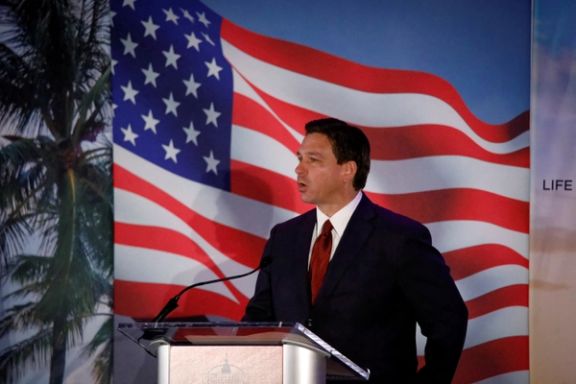
Republican presidential candidate Ron DeSantis has criticized the Biden administration over its Iran policy, vowing a stronger posture against the clerical regime.
DeSantis, presumed to be Donald Trump’s main competitor on the path to the 2024 Republican nomination, told Israel Hayom Thursday that the current administration is “more interested in kowtowing to Iran than standing by our allies,” describing US-Israel relationship under President Joe Biden as “disgraceful.”
“My view as president would be we're going to have a really strong US-Israel relationship,” said DeSantis, who announced his presidential bid in May and polls show that he currently has the best shot at beating Trump in the fight over his party's nomination.
Accusing the administration of prioritizing Iran over Israel, he said “You can't try to cozy up to them (Iranians). "So we would be supportive of Israel's predicament. And obviously, we would have a much stronger posture against Iran."
The Biden administration is reportedly discussing an unwritten deal with Iran to release money in exchange for limited concessions by Tehran.
“The whole Obama-Khamenei deal [2015 JCPOA nuclear agreement] was a total disaster and Biden is trying to resuscitate,” he said, highlighting that concessions to the Iranian regime means more money used to foment terrorism.
He vowed to squeeze the Islamic Republic so that the regime understands that pursuit of terrorism “is going to be bad for them economically, diplomatically, and potentially even militarily. “That is the way the only thing that the mullahs understand – strength," he underlined.
“Iran represents an existential threat to the State of Israel. Now they would love to wipe Israel off the map. They would love to wipe out America,” he added.
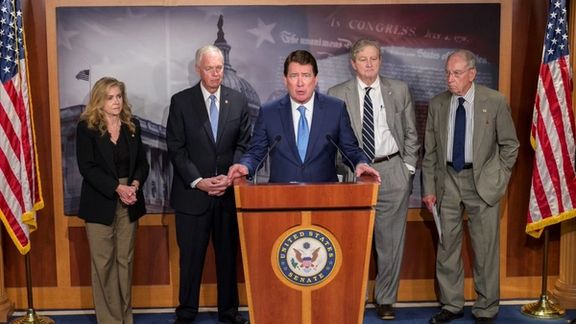
Reports on a possible unwritten deal between Washington and the Iranian regime has led to multiple Congressional initiatives to ensure legislative oversight.
On Thursday 33 US senators joined to introduce the Iran Sanctions Relief Review Act (ISRRA – S.488) to “make it abundantly clear to the Biden Administration that any agreement made with Iran that involves sanctions relief must be submitted for Congressional review,” said Senator Bill Hagerty (R-Tenn) who leads the effort.
When in 2015 the JCPOA Iran nuclear deal with Iran was concluded, the Obama administration seeing serious opposition in Congress decided not to make it a treaty requiring Senate approval. As a tactic to reduce opposition, Obama agreed to the Iran Nuclear Agreement Review ACT (INARA) to allow Congress to oversee future dealings with Tehran, especially any reduction in sanctions.
As all signs point to indirect and even direct talks with the Islamic Republic emerge, many in Congress fear that the Biden administration is moving toward releasing Iran’s frozen funds in countries such as Iraq and South Korea, and possibly even sanctions in return for an Iranian pledge not to enrich uranium beyond 60 percent. Many lawmakers regard such a deal as harmful because Iran has already stockpiled enough enriched uranium to be able to quickly produce weapons-grade material if it decides to produce for nuclear weapons.
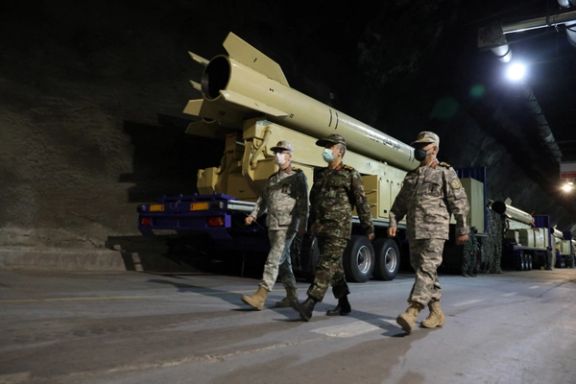
The Washington Free Beacon also reported on Thursday that Republicans in the House of Representatives are preparing to subpoena top Biden administration officials over the secret talks with Iran. The effort is led by the Republican Study Committee, the largest conservative caucus in the US Congress. The group intends to subpoena Iran envoy Robert Malley and White House national security aide Brett McGurk, both seen as key players in ongoing secret talks with the Islamic Republic.
At same time, more than 200 prominent Iranian Americans have written to Rep. Michael McCaul, Chairman of the House Foreign Affairs Committee asking him to subpoena US special envoy for Iran Robert Malley, who is deeply distrusted by Iranian activists and others opposed to the Iranian regime.
“We therefore implore you to subpoena Mr. Malley to provide, under oath and in a public hearing, a rundown of what has been agreed upon with the regime,” the letter asked Rep. McCaul, and added, “We consider access to and knowledge of this information to be unalienable right of the American people and our community, as our friends and families inside Iran suffer under the tyranny and brutality of the Islamic Republic regime.”
Some prominent signatories were; Reza Behrouz, physician and Professor at the University of Texas ; Yass Alizadeh, Assistant Professor of Persian language and literature at New York University; Atlanta-based attorney Sasan Nematbakhsh; DC-based legal scholar Shima Bozorgi; Amin Sophiamehr, philosophy instructor from Indiana University and Sara Eshaghi of the California-based group, “Action for Iran.”
This week, a bipartisan group of 26 senators sent a letter to the White House expressing concern over reports that the administration is trying to reach a limited deal with Iran without Congressional oversight.
“It is imperative today that we strengthen our efforts to deter Iran from achieving nuclear weapons capability. We must make Iran understand, in no uncertain terms, that further advances in its nuclear program will be met with unified international action,” the 26 senators wrote to Biden.
“It is crucial for your administration to remain aligned with Congressional efforts related to Iran’s nuclear program and not agree to a pact that fails to achieve our nation’s critical interests,” the letter said.
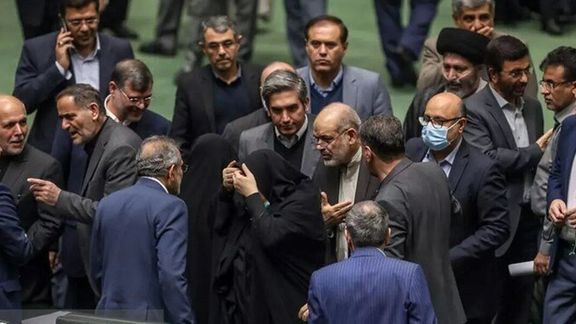
Under immense pressure by more than 200 lawmakers, Interior Minister Ahmad Vahidi promised this week to fire his political deputy Mohammad-Reza Gholamreza.
Deputy Interior Minister for Political affairs who also chairs the ministry’s Election Supervisory Board for the upcoming parliamentary election in March, had issued a statement to bar lawmakers from intervening in executive affairs in their constituencies.
The ministry's concern was mainly about interference with the election process by lawmakers who wish to be re-elected. Apart from the conflict of interest issue, another concern was undermining the prerogative of the executive branch.
More than 200 lawmakers tabled a motion Monday night to impeach the interior minister. This was a vehement threat, as calls for impeachment are usually signed by between 20 to 40 lawmakers. Vahidi was caught in a situation no minister would want to be in, particularly as Tuesday morning government ministers and President Ebrahim Raisi were going to the Majles to defend the nomination of a new agriculture minister.
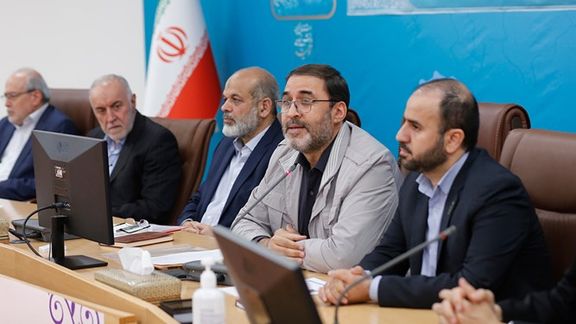
The social media rumor mill pointed out early in the morning that the President and the Interior Minister will have to step back, otherwise the lawmakers will impeach the interior minister and will not give their vote of confidence to the new agriculture minister. This was probably what played out in the corridors of power in Iran: Another tempest in the teacup as the man in the street cannot care less about a government that has messed up the economy and a parliament that cannot hold the government to answer.
The Interior minister overruled his deputy's order practically allowing lawmakers to interfere in the hiring and firing of local government officials in order to control the election process. But the lawmakers were still not happy. They demanded the removal of the deputy interior minister. They further threatened that they will go ahead with the interior minister's impeachment if his deputy was not removed from his post until Saturday, the beginning day of new week in Iran.
According to reformist daily Shargh, some lawmakers such as Shahryar Haidari said that the statement issued by the deputy interior minister was an insult to lawmakers. Others also made equally angry remarks partly to show their clout to potential voters in the next election. They also demanded an apology from the Raisi administration.
Others accused the interior ministry of undermining Supreme Leader Ali Khamenei's order for cooperation between the Majles and the government. Nothing in Iranian political circles can be as damning as accusing someone of disobeying Khamenei.
Etemad Online and other news sources in Iran pointed out that Vahidi's arrival at the Majles Tuesday morning caused an uproar among more than 200 of Iran's 290 lawmakers. Interestingly, they said they wanted to impeach Vahidi for his poor performance during the 2022 protests. Another interesting point was that although the Majles presidium usually objected to calls for impeachment, they were supportive of the angry lawmakers.
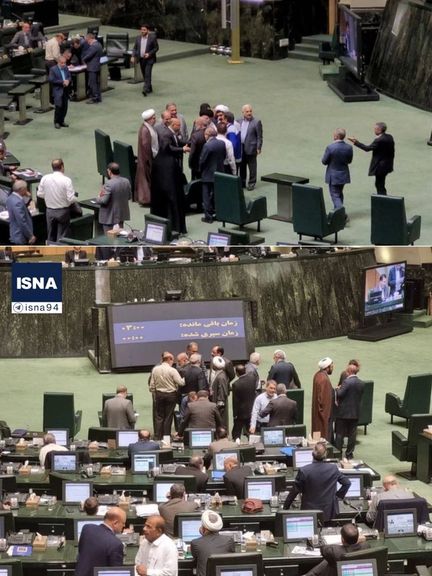
After a closed-door session, Vahidi promised to fire his deputy, but this does not necessarily mean that Gholamreza will be dismissed. He is an IRGC general and enjoys support within the ranks of the corps. On the other hand, as far as the government is concerned, the MPs should not be emboldened beyond what they have achieved.
By midday, the crisis appeared to be over. The lawmakers who have always been accused of being intimidated by the government shouted at Vahidi and restored their credibility in the eyes of their constituents. The government was happy to have won the lawmakers' vote of confidence for a new agriculture minister and Vahidi barely saved his pride by postponing his deputy's removal to a future date that may not happen.
In the Iranian political circus, everyone is a winner until Khamenei's next speech when he chooses who is going to enjoy his support and who is going to be faced down.
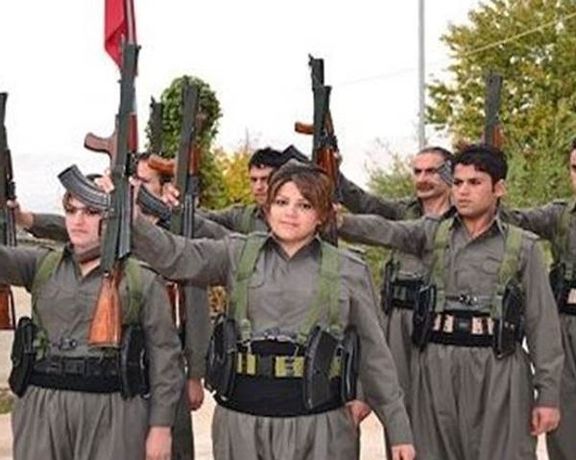
Clashes between two Kurdish parties in Iran left at least two dead and three wounded.
Following the collapse of the alliance between the Organization of the Toilers of Kurdistan and the Komala Party of Iranian Kurdistan, an armed conflict occurred between their Peshmerga forces on Thursday morning, reported Hengaw Human Rights Organization.
The Komala Party announced on Wednesday that the efforts for an alliance have failed, and they will continue their activities independently.
Sources told Iran International the security forces of the Iraqi Kurdistan region entered their camps and ended the conflict.
In a tweet, Hengaw called on the two parties to "stop the military conflict and plan for an immediate mechanism to hold negotiations and end the disputes."
The human rights organization also expressed readiness "for any mediation to resolve disputes peacefully."
Rudaw Kurdish news agency reported the conflict took place in the Zargawez in the Kurdistan region of Iraq.
The Islamic Republic had previously called for the implementation of the security agreement with Iraq to prevent the activities of Iranian Kurdish parties in the Kurdistan Region of Iraq.
Komala has been engaged in guerrilla warfare against the Iranian government, notably during the 1979 Kurdish rebellion and the Iran–Iraq War.
The Organization of the Toilers of Kurdistan, also known as the Komala Reform Faction, is an armed communist and separatist ethnic party of Kurds in Iran based in northern Iraq. It split from the Komala Party of Iranian Kurdistan in October 2007 over internal disagreements but reunited with them in November 2022.
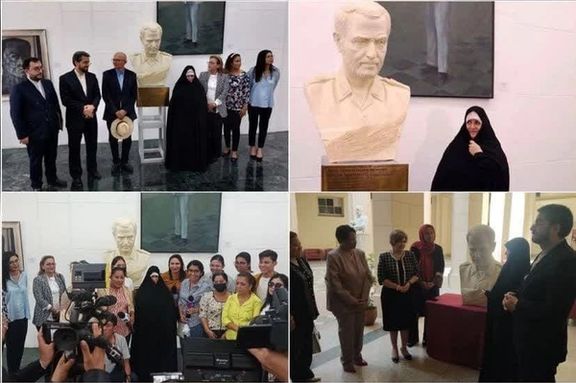
As part of the regime’s propaganda, two busts of the former IRGC Quds Force Commander Qasem Soleimani were erected in Cuba and Nicaragua.
During the recent trip of Ebrahim Raisi to Latin America, two figurines of Soleimani were unveiled by the wife of the President of the Islamic Republic of Iran, Jamileh Alamolhoda, in the two countries, Tasnim News Agency reported Thursday.
On January 3, 2020, the US military, on the order of President Donald Trump, killed Soleimani in a drone strike near Baghdad International Airport, saying that he had been "actively developing plans to attack American diplomats and service members in Iraq and throughout the region."
One of the busts was placed in the Hall of Heroes of Nicaragua in the presence of the Ministers of Culture, Family and Science, and another one the University of Havana with the Head of the Communist Party of Cuba and the Dean of the University of Havana attending the ceremony.
“Soleimani was a man of action and a hero in the fight against terrorism for the women of the region and a harbinger of security for the whole world,” said Alamolhoda on the sidelines of the ceremony.
On Saturday, Saudi Arabia's Foreign Minister Prince Faisal bin Farhan refused to hold a joint presser in Iran under Qassem Soleimani’s picture and the presser was relocated.
The Qods Force under Soleimani became deeply involved in the conflicts in Syria and Iraq, setting up militant proxy militias.